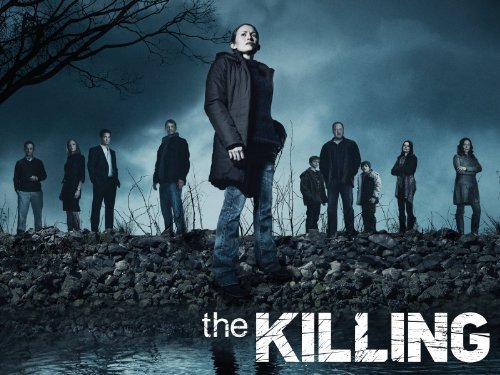 |
| The Killing promotional still. |
Written by Leigh Kolb
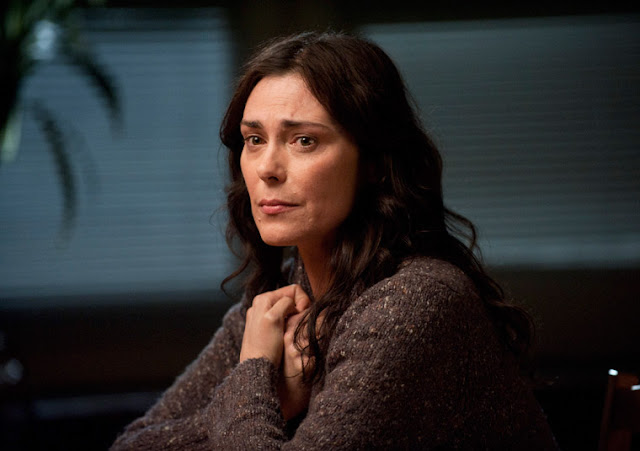 |
| Mitch Larsen: bad mother. |
“Her daughter may or may not have been a prostitute or involved in some illegal doings at a casino. And she ended up dead seemingly because of it. But instead of hunkering down and paying more attention to her remaining children, Mitch left her sons to be raised by a depressed father and their hooker aunt while she went off to live in a motel and act creepy around wayward runaway girls.”
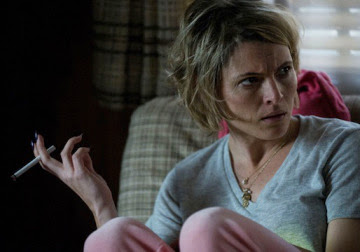 |
| Danette: bad mother. |
While these supporting characters’ relationships with their daughters are troubled, and it would be easy for the audience to “blame” the victimization of the daughters on their mothers, it wouldn’t be correct. We are so used to complex, fallible male characters that we are also conditioned to see them as complex and fallible, not good or evil. When we’re presented with women with the same depth of characterization–especially mothers–we don’t know what to do except what we’ve been conditioned to do: criticize them and blame them.
This is blatantly obvious when we consider the show’s protagonist, detective Sarah Linden (played by the amazing Mireille Enos).
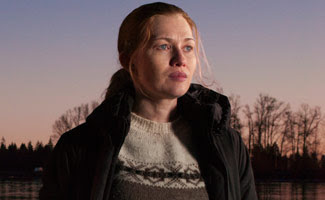 |
| Sarah Linden: bad mother. |
“We all struggle with the work-life balance thing, and detective Sarah Linden is hardly an exception. Finding time to mother her son, for instance, seems to be a challenge. Jogging, however, she manages to squeeze in. And it’s a good thing, too. Because Linden (finally) got a major break in the case this week, and it’s all thanks to the fact that she prioritizes cardio over sleep, parenthood, marriage, friendship, or updating a sweater collection that appears to have been sourced from Dress Barn circa 1997.”
“But she’s still the World’s Worst Mother — her son lives in Chicago and she won’t visit because, well, he’s the only person she knows there. Wow, Linden. Just, wow.”
In a Salon review from last year (which, remarkably, denounces The Killing for not being “fun” enough), the reviewer slips in, “Yes, it’s still raining, and Linden’s still a bad mother…”
“Sarah Linden refuses to accept that her inattentiveness is gravely affecting her son until she is forced to reckon with her absence around him. And in Mitch Larsen (Michelle Forbes) we bear witness to a character who is present in her daughter’s life and yet still positioned at a significant remove from the darkest secrets of her adolescence. In the end, of course, this is the scariest aspect of all.”
At Bitch Flicks, Megan Kearns posted in the first season how it was “refreshing” to see this kind of character trying to navigate her different roles, and that “the lead character is an accomplished single mom striving to keep her son out of trouble all while maintaining her demanding career.” She manages to do that by the third season, but it’s still not good enough.
Instead, audiences and critics alike focus much too closely on the female protagonist’s failings as a mother. We do not do that with male protagonists. (OK, six seasons in, after an episode highlighting parenting, Jezebel posted about how Don Draper was a “shitty dad.”)
Is Dexter a good father? What about Rick Grimes? Walter White?
Certainly there are lists of “bad dads” in TV/film, but the tone is different, more tongue-in-cheek. And a focus on these characters’ fathering abilities doesn’t run throughout conversations about the show, especially not with the same venom we see about Linden. When there’s a bad father in the mix, it’s just a poignant piece of a Joseph Campbell hero’s journey. Bad mothers, however, deserve to be burned at the proverbial stake.
There is a dearth of female antiheroes in film and television. The response to Sarah Linden shows why this is. When audiences see female characters, they think primarily in critical terms, especially about their roles as mothers and wives. (Of course this extends past fictional characters; there’s consistent and persistent hand-wringing about real-life women working too much and not being good enough mothers.) Women aren’t perfect (especially within the narrow confines of perfection that our society has put in place). Female characters shouldn’t be perfect.
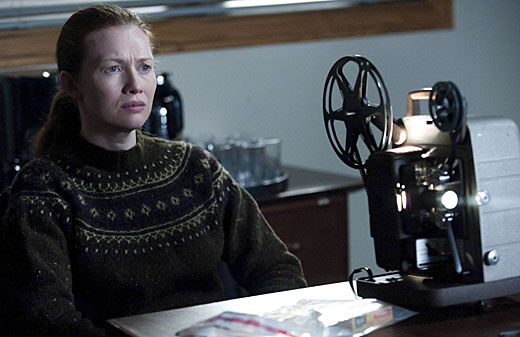 |
| My son is doing fine and my sweaters are warm and comfortable, assholes. |
Linden’s role as a parent, girlfriend and ex-wife is just one small part of the grand scheme of the show. Her partner, Stephen Holder, has a girlfriend this season. He forgets Valentine’s Day and is never home. He is not painted as a villain, because he’s out getting shit done. He’s doing his job. That is what is important in The Killing. So when critics focus (in depth, or just in passing) on how terrible a mother Linden is, that further erodes what should be good about having strong, complex female characters.
Leigh Kolb is a composition, literature and journalism instructor at a community college in rural Missouri.

Great piece! I also find it refreshing that Linden’s mothering is dealt with in such a matter-of-fact way on the show – motherhood has many sides to it and its about time we see more of that in film/television!
I love this piece so much, Leigh. This is one of my favorite shows on TV, and this season in particular is fascinating.
It would be more appropriate to label Linden as a struggling mother than a bad one. While it’s easy to say that Danette isn’t a great mom, I do enjoy the juxtaposition of the two characters; both single mothers on different paths.
So true. In films or books, as in real life, bad parenting is never an allegation used against men unless they abandon or physically abuse their children. Women on the other hand are held to an impossibly high standard.
I really wanted to hate this piece. But you’re so spot on that I can’t. Thanks for making me think!
I agree! A myriad of female characters is such a good thing, and this show definitely gives us that. The young women, too, are multi-faceted.
This season is amazing.
I could quote a thousand examples of the quintessential perfect mother, who can never do wrong, but that is as equally bad representation of reality. The fact is, there are some more mature and prepared, and some who are not…It is regretful, though, if some writers/producers focus on one group or another…too many issues to let it go, or not enough maturity to se the big picture?
Leigh, I really disagree with the contents of this piece. The series paints EVERYONE as deeply flawed and I think there is a hatred of bad parents that exists in our culture that is frankly passed around quite evenly between the genders. If the hatred of bad mothers is more prevalent than that of bad fathers, which I don’t agree is the case – especially if we look at things like custody decision-making as a clue – then it is in part because of the physicality and biology involved in child-rearing. It’s hard to reconcile a nursing child with whatever potential horrors may await them as those visuals seem instinctively viserally difficult to imagine hand-in-hand.
I will concede I could be wrong here (although, I know I’m not wrong that the killing uses the ugly brush on all humans, regardless of gender- and that this is part of the beauty of the show. The scene were Holder and Linden sit on the sofa chain smoking after the near-kiss is a beautiful example of this. Also, what about Saarsgard’s portrayal of death-row-daddy? I would argue that there was quite a lot of hatred for him, and yet as with Linden’s more redeeming qualities, he too had a moment of more positive humanity. It strikes me as preposterous (especially the title of your article) to not highlight this point and it bothers me that you’ve missed this.
Your point about the media’s reception might have a little more meat except for one thing: warning and finger wagging at society for having a little bit of loathing towards bad mothers (or fathers because sometimes papa IS a rolling stone) – leaves those of us with erm… challenged mama-ing voiceless and condemned by the majority. In my world, it’s practically taboo to say anything negative about a mother and yet saying negative things about fathers is pretty widely accepted. I had many friends in childhood and teen years struggling with a similar tightrope, you unequivocally do not discuss a flawed mother without someone looking at you askew or being seen as a terrible ungrateful monster. As many have challenges with both parents, it’s not difficult to observe the change in receptiveness as comforting switches to condemnation when a child or adult discusses the patriarch vs the matriarch in their less-than-nuclear-ideal-family
I have been reading many of this site’s comments on media and I feel this is a great contradiction to much of the “it’s wrong to sheild women from criticism as we’re not fragile snowflakes’, as well as to the rather powerful and insightful articles of yours that I had the opportunity to gaze upon.
Anyways, this one bugged me. So did the one about Scandal but that was a guest piece and a whole other bag of worms. Curious to know whether you think that Series is a valuable asset for women.
I do hope you’ll reconsider your defense of motherhood because there are daughters (and sons) out there that need some defending that unless they have a very obvious “Janette’ on their hands, remain largely unheard and alone in their struggles to reconcile their reality with society’s mother-pedestal-complex. .
p.s. sorry for typos (the editor in me doesn’t work evenings ;). I would also like to quickly state that there are many flaws in the killing, but the sharing of big gaping flaws that make you uncomfortable is NOT one of them. I feel you missed this mark and hope that you take another look here.
Despite our difference in opinion here, I’d like to say thank you for the SOA points.
Much respect, ta.
wow! What semantic, feminist turd you’ve given us all with this article.
Who cares about Mitch. Shes an extremely self-centered, selfish person. That transcends being a bad mom, that makes you a bad person, male or female.
…and it isn’t misogyny. Women are held to a higher standard of parent, are they not? Men have always been the bad parent, until the modern era. Of course you don’t seem to know much history…and why would you, it doesn’t seem to favor women in any sort of way. But what it does show is that women have always been the “strong” parent, with the most influence in child rearing. They are trusted with our children. Men are not. That is the imbalance you speak of but fail to recognize. It’s the same thing for a Police officer. They are way less likely to get sympathy for committing crimes then a normal citizen, because they are the ones in which we trust not to. Women have more pressure from society to raise children correctly. That is not misogyny. That is part of their gender’s role. But I suppose in the ideological world that you live in, gender roles are “bad” too.
“Sarah Linden may not be a full-time mother. But she’s a bad-ass mother, and that is what should matter most.”
…are you fisting me? What show are you watching? Because in the show I was watching, Sarah Linden was a criminal, borderline psychotic, reckless, anti-social, selfish, neglectful, and a hundred other things I wouldn’t call “bad-ass”. But since it is a women, I must just be a woman hater, eh?
Your a joke. I wouldn’t give you the press credentials to cover the grand opening of a new Starbucks. You want to blame society for their view on women. You realize that women make up half of society, right?
….like the double standard and the pressure to look good. Thats a laugh that you think that comes from men. Do you think men look at fashion magazines? Do you think guys care if a girl is slutty or not?
If you answered yes to either of those questions you are as ignorant about men as the day is long. More importantly, your a feminist, and to me, that is the same thing as being a sexist in reverse.
I am annoyed with Linden not because she is a bad mother but because of the housing situation. I realize that she was in foster care and her nature is to run away. Then to only live in a places for a brief period of time. I just wish she realized one thing about her parenting skills. How she was putting Jack through the exact same thing she went through as a child as a child. Moving from place to place running away. Jack alone feeling unsafe in the cheep motel apartment he called home that day. Linden works 7 days a week like 16 hour days. She must have enough money for at least a real apartment or to rent a house for Jack.
There is a definite thread of bad mothers in this show. However, since most tv and movie stories are about bad fathers, it is interesting, and a little troublesome, I have to admit.
I’d just like to chime in a year late to say HELL YES, and I couldn’t disagree with the other commenters more. I really love the complexity of Linden’s character and the way she and her son try to take care of each other, especially in season two. There’s a real push-pull of concern and responsibility and rebellion from both sides that I find really fascinating.
A child shouldn’t have to be the concerned responsible party ever. Push pull of concern and responsibility between parent and child in this example is bs. Hey son? I have a career that im not going to balance with my other duties so you’ll be eating out of vending machines, have no stable living arrangement, and I’ll be absent the majority of the time ok? Thanks so much for your concern and responsibility…. FAIL
Meh. Some mothers really ARE terrible.
Just watched the pilot and season 2 finale again, and remembered this. Both the show and your article – terrific!
Most replies in Complete disagreement with the author have been removed. I know because I posted several times and no matter how polite the posts were when I came back they were gone. Seems very biased and fascist.